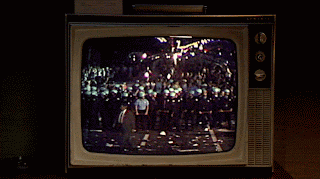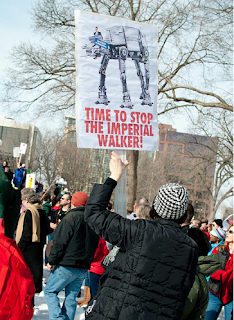Mad World on Kritik: Mad Men Season 6.10
"Us, Them"
Guest Writer: Caroline Levine
Monday, June 3, 2013
posted under
A Tale of Two Cities
,
binary logic
,
Charles Dickens
,
Chicago Democratic Convention
,
Levine
,
Mad Men
,
Mad World
,
Season 6
by Unit for Criticism

[The ninth in the Unit for Criticism's multi-authored series of posts on Season 6 of AMC's Mad Men, posted in collaboration with the publication of MAD MEN, MAD WORLD: Sex, Politics, Style, and the 1960s (Duke University Press, March 2013) Eds. Lauren M. E. Goodlad, Lilya Kaganovsky and Robert A. Rushing]
"Us, Them"
Written by: Caroline Levine (University of Wisconsin-Madison)
Carnation Instant Breakfast or Life cereal? CGC employees or the SCDP team? On the one hand, this episode is pretty relentless in its insistence on division. It’s either them or us: New York or Los Angeles, Joan or Pete, Humphrey or Nixon, demonstrators or cops. Don reminds Megan that she’s Canadian, not a US citizen. Avon Cosmetics faces a choice between getting groovier and waxing nostalgic. Joan think she’s on a date, but it turns out to be a business meeting. She then replaces Pete at breakfast, while Carnation replaces breakfast itself. Not both. One or the other.
But what can be shared, exactly? “The whole world is watching,” chant the protestors at the Chicago Democratic Convention as they are brutally beaten by the police on national television. We watch Don, Megan, and Joan watching, sharing the televised experience of the Convention with millions of others. But this is togetherness without amity, without concord, without partnership. Megan is scared, Joan horrified, Don dismissive. The experience of network television news joins but also separates, inviting us to enter the common world of public life from the privacy of our living rooms. And the world it allows us to share is a scene of violence and discord.
Read more
"Us, Them"
Written by: Caroline Levine (University of Wisconsin-Madison)
Carnation Instant Breakfast or Life cereal? CGC employees or the SCDP team? On the one hand, this episode is pretty relentless in its insistence on division. It’s either them or us: New York or Los Angeles, Joan or Pete, Humphrey or Nixon, demonstrators or cops. Don reminds Megan that she’s Canadian, not a US citizen. Avon Cosmetics faces a choice between getting groovier and waxing nostalgic. Joan think she’s on a date, but it turns out to be a business meeting. She then replaces Pete at breakfast, while Carnation replaces breakfast itself. Not both. One or the other.
And yet, in California, “everyone shares”—at least according to Don’s drugged fantasy of a hippie Megan. Don has always been two rather than one: Don Draper and Dick Whitman, husband and lover, outsider and insider, ethical hero and repellent antihero. And his preference for both/and turns out to govern this episode as much as either/or. Ted shuts Pete up with the assertion that “we’re all working together: all agency business is your business.” Peggy, after fighting bitterly with Joan, rescues her. And of course, the episode ends with the overcoming of a bitter conflict. A shared identity for the agency replaces a string of separate names and letters in a new prospect of togetherness: Sterling Cooper & Partners. “Partners” in the name does double work: the word itself is a compromise that requires both sides to give up their individual identities, and what it conveys is an assertion of their new identity as partnership rather than opposition.
But what can be shared, exactly? “The whole world is watching,” chant the protestors at the Chicago Democratic Convention as they are brutally beaten by the police on national television. We watch Don, Megan, and Joan watching, sharing the televised experience of the Convention with millions of others. But this is togetherness without amity, without concord, without partnership. Megan is scared, Joan horrified, Don dismissive. The experience of network television news joins but also separates, inviting us to enter the common world of public life from the privacy of our living rooms. And the world it allows us to share is a scene of violence and discord.
Read more





















